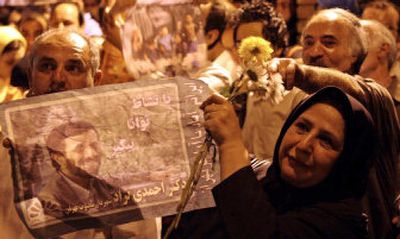President-elect of Iran to push ‘Islamic’ model

TEHRAN, Iran – Iran’s new president spoke Saturday of making Iran a “modern, advanced, powerful and Islamic” model for the world, borrowing the style of the hard-line ruling clerics that backed him in his landslide victory.
Mahmoud Ahmadinejad’s brief radio address to the nation did not mention his views on the future of Iran’s growing social freedoms – leaving liberal critics still fearing the worst.
It was an ironic twist that Iran’s first non-cleric to reach the country’s highest elected office since the 1979 Islamic Revolution was more religiously unyielding than the cleric he defeated, former president Ayatollah Hashemi Rafsanjani.
“My mission is creating a role model of a modern, advanced, powerful and Islamic society,” he said in the message broadcast shortly after the announcement of final results sealed his stunning defeat of the self-proclaimed moderate Rafsanjani.
The victory gives conservatives control of Iran’s two highest elected offices – the presidency and parliament.
The results, announced on state television, gave Ahmadinejad 61.6 percent of the vote to Rafsanjani’s 35.9 percent. The rest of the ballots were deemed invalid.
Turnout among Iran’s approximately 47 million eligible voters was more than 59 percent. In last week’s election, the turnout was close to 63 percent.
The president-elect has said he is in no hurry to re-establish relations with the United States, which cut diplomatic ties with Iran after its embassy was besieged for 444 days and 52 employees held hostage in 1979. As a student, Ahmadinejad (pronounced aah-MA-dee-ni-JAHD) joined an ultraconservative faction of the Office for Strengthening Unity, the radical student group that staged the embassy’s capture.
“The United States was free to cut its ties with Iran but the Iranian government is free to decide about restarting its relationship with the United States as well,” Ahmadinejad said on his Web site. “This decision will be made when Iran has the guarantee that its interests will be secure in any new relationship.”
Governments of Muslim countries offered cautious congratulations in response to the election, while several Western countries – including the United States – sharply criticized the vote Saturday. There were complaints that the candidates allowed to run for president were decided by the powerful Guardian Council, made up of clerics, who disqualified upward of 1,000 contestants, including 50 women.
In Washington, White House spokeswoman Maria Tamburri said Saturday the United States was concerned about the fairness of the elections.
Ahmadinejad, now Tehran’s mayor, has not revealed the makeup of his Cabinet, but his deputy campaign manager told the Associated Press that a 200-member team cobbled together during the presidential campaign has been poring over names and resumes.